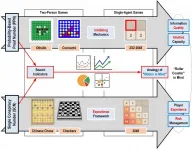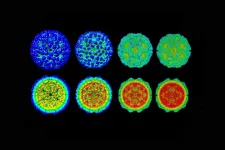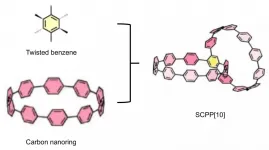Combination therapy of nivolumab and relatlimab before and after surgery is effective against melanoma (Abstract #9502)
In a Phase II study, MD Anderson researchers showed that a regimen of neoadjuvant and adjuvant treatment with checkpoint inhibitors nivolumab, a PD-1 inhibitor, and relatlimab, a LAG-3 inhibitor, was safe and effective in patients with resectable clinical stage III melanoma.
Thirty patients were enrolled in the study and received two doses of nivolumab with relatlimab before surgery, followed by up to 10 additional doses of the combination therapy after surgery. The regimen achieved a pathologic complete response (pCR) rate of 59% and major pathologic response rate of 66%. The overall response rate (ORR) was 57%. With a median follow-up time of 16 months, the regimen resulted in an event-free survival of 90%, relapse-free survival of 93% and overall survival of 95%.
Previous studies combining ipilimumab and nivolumab in the neoadjuvant setting for stage III melanoma have shown high pCR rates, which indicates the absence of actively growing cancer cells in tissue removed during surgery but led to high-grade toxicity in 30-40% of patients in the neoadjuvant setting. The current study of nivolumab and relatlimab resulted in no Grade 3 or 4 adverse events prior to surgery and no delays to surgery. During adjuvant treatment, 26% of patients experienced a Grade 3 or 4 adverse event.
"The old standard of care was that stage III melanoma patients get surgery first, but we've shown they can really benefit from a neoadjuvant approach," said Rodabe Amaria, M.D., associate professor of Melanoma Medical Oncology, who will present the findings. "Hopefully, our research will lead to a new treatment paradigm for metastatic melanoma patients."
Amaria and other researchers are continuing to follow patient outcomes and will be conducting further translational studies to discern the mechanisms of response and resistance to this combination.
Neoadjuvant talazoparib shows activity in patients with germline BRCA1/2 mutation-positive, early HER2-negative breast cancer (Abstract #505)
In a nonrandomized, open-label Phase II study, MD Anderson researchers demonstrated that talazoparib, a PARP inhibitor, showed activity in patients with germline BRCA1/2 mutation-positive, early HER2-negative breast cancer.
The study enrolled 61 patients with stage I-III breast cancer and a germline BRCA mutation who were treated with talazoparib for 24 weeks prior to surgery. The drug achieved a pathologic complete response (pCR) rate of 45.8% in the evaluable population and 49.2% in the intention-to-treat population. The pCR rates were comparable to those observed with the standard combination of anthracycline- and taxane-based chemotherapy regimens.
"This study built upon our previous single-institution study but enrolled patients at multiple sites with germline BRCA mutations and early-stage TNBC and continued to demonstrate that a daily oral PARP inhibitor, talazoparib, did demonstrate pCR in almost half of the patients on the study," said Jennifer Litton, M.D., vice president of clinical research and professor of Breast Medical Oncology, who will discuss the study.
BRCA1/2 gene mutations account for 5-10% of all breast cancers and 9-15% of TNBC, which is more aggressive and has a poorer prognosis than other types of breast cancers. With limited treatment options, preoperative chemotherapy is still standard therapy for this hard-to-treat population. However, emerging targeted therapies are offering novel approaches to the treatment of the disease.
Talazoparib was generally well-tolerated and treatment-emergent adverse events were consistent with the established safety profile. Further studies are being considered to directly compare it to standard-of-care chemotherapy.
HER2-targeted therapies demonstrate activity in tissue-agnostic trial for certain patients with HER2-positive tumors (Abstract #3004)
Results from the Phase II My Pathway basket trial found that the HER2-targeted therapies pertuzumab and trastuzumab demonstrated durable activity in patients with a wide variety of tumors marked by HER2 amplification or overexpression, although responses were limited in those with KRAS mutations.
Pertuzumab and trastuzumab are antibody therapies that bind HER2 and block its activity. HER2 is amplified or overexpressed in 2-3% of all solid tumors, but therapies against HER2 only are approved for breast, gastric and gastroesophageal cancers.
The study enrolled 258 patients across a variety of tumor types, excluding those for which the therapies already are approved. The most common cancer types enrolled were colorectal, biliary and non-small cell lung cancers. Side effects on the study were consistent with previous reports of these drugs.
Sixty patients (23.3%) had a confirmed objective response, indicating tumor shrinkage, including five complete responses. The disease control rate was 44.6% and duration of response was 7.9 months. Notably, patients with KRAS mutations did not have a high response rate, with just one objective response among 26 patients.
"This trial truly demonstrated the value of the basket trial design in assessing efficacy across tumor types, as well as the impact of co-alterations," said Funda Meric-Bernstam, M.D., chair of Investigational Cancer Therapeutics, who will present the findings. "These agents were active in a wide variety of KRAS wild-type, HER2-amplified or -overexpressed tumor types, with notable activity in colorectal cancer and salivary tumors. However, there was limited activity in KRAS mutant tumors, emphasizing that in precision oncology, we need to consider the full genomic profile in treatment selection."
Adavosertib with or without olaparib shows efficacy in women with PARP inhibitor-resistant ovarian cancer (Abstract #5505)
Clinical trial results from the randomized, non-comparative Phase II EFFORT study showed that adavosertib, a Wee1 inhibitor, was effective in patients with PARP inhibitor-resistant ovarian cancer when given alone and in combination with olaparib, a PARP inhibitor.
This trial was based on early research demonstrating that resistance to PARP inhibitors may be reversed by the inhibition of Wee1, a protein kinase that has become a viable therapeutic target in cancer due to its role in regulating DNA damage repair pathways and checkpoints.
The study enrolled 80 patients with recurrent ovarian, fallopian tube or primary peritoneal cancer with documented progressive disease on a PARP inhibitor. In patients who only received adavosertib, the drug achieved an overall response rate (ORR) of 23% and a clinical benefit rate (CBR) of 63%, while patients who received the adavosertib-olaparib combination had an ORR of 29% and a CBR of 89%.
Several PARP inhibitors have been approved by the Food and Drug Administration for ovarian cancer over the past few years and their use in cancer therapy has increased over time, but cancer cells can develop a resistance to this new class of drug that reduces their therapeutic effectiveness.
"These results meet a critical unmet need. Clinically, we have observed innate resistance in patients who we would expect to benefit from a PARP inhibitor. Conversely, there are patients who may initially benefit but then ultimately have disease progression," said Shannon Westin, M.D., associate professor of Gynecologic Oncology and Reproductive Medicine, who will present results of the study. "These two populations of patients are growing, and we're seeing them in our clinic every day."
Larger randomized trials will be required to better understand the efficacy of the drugs, as well as to determine which patients need a single agent or combination therapy.
INFORMATION:





